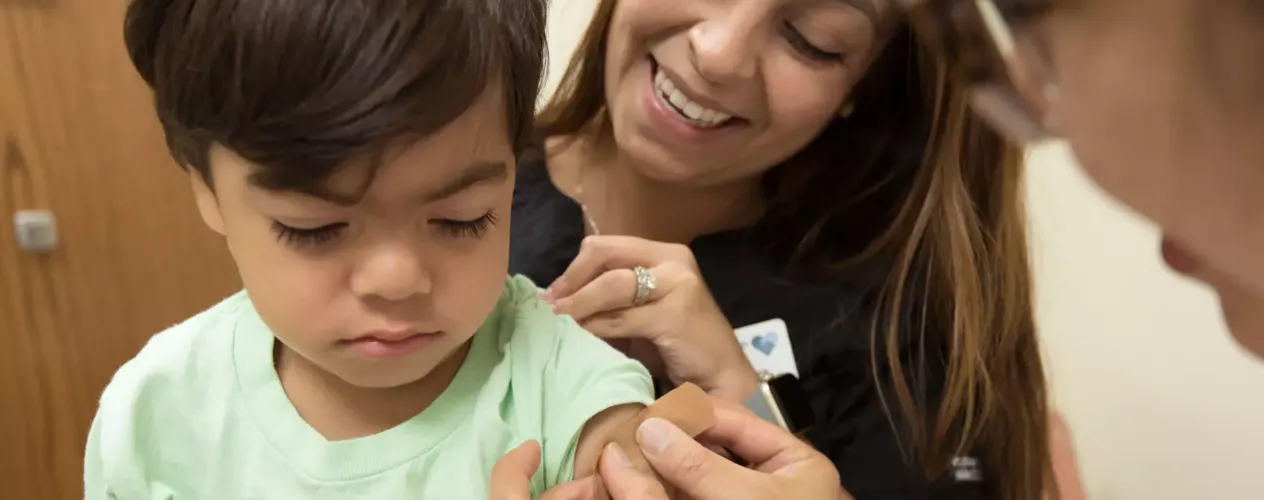Research shows plunge in childhood vaccination rates in Texas during pandemic
The declines in vaccinate rates were greatest for 5-month-olds and 16-month-olds.

A team of researchers from universities in California and Texas has found immunization rates for children in Texas for a wide range of diseases, including polio and measles, have dropped steeply during the COVID-19 pandemic.
The researchers, from the UCLA Fielding School of Public Health, University of San Francisco, Texas A&M, Rice, and Baylor, found a 47% relative decline in immunization rates between 2019 and 2020 among 5-month-olds and a 58% decline among 16-month-olds. They also saw a small decline (5%) among 24-month-olds, and no decline in vaccines commonly received at birth.
“The vaccinations being missed are for diseases that can deadly, and which have been – largely – defeated in the United States through vaccination campaigns,” said Dr. Annette Regan, a UCLA Fielding School of Public Health adjunct assistant professor of epidemiology who also teaches at the University of San Francisco.
“One of the problems in Texas is that these COVID-related declines are superimposed on increases in state vaccine exemptions and pre-existing declines in rates of some childhood vaccines over the last five years, due to an aggressive anti-vaccine movement,” said Regan, senior co-author of the study. “Continued declines in childhood immunization coverage due to COVID-19 could lead to co-endemics of measles and other vaccine preventable diseases.”
The study – “Childhood immunization during the COVID-19 pandemic in Texas” – is being published in the June edition of the peer-reviewed journal Vaccine; it is currently available in electronic form. Co-authors include Dr. Peter Hotez, with the Texas Children’s Hospital Center for Vaccine Development and Center for Medical Ethics and Health Policy and the National School of Tropical Medicine at Baylor.
“As terrible as COVID has been, we still must face the reality that it’s social disruption and subsequent vaccine declines could lead to a return of other childhood infections,” Hotez said.
The researchers say the drop in vaccinations stems from multiple issues. These include that in 2020, the state of Texas implemented social distancing guidelines in order to prevent pandemic-related surges at hospital emergency rooms and in intensive care units. As noted in other states, an unintended consequence of these activities has been significant declines in childhood immunizations.
Despite recommendations from the CDC in March, 2020, for states to issue guidelines for continuing vaccinations for children under 2, physical distancing policies have produced reductions in the availability and use of routine childhood vaccinations in several states. State-sponsored shelter-in-place mandates in some states, including Texas, resulted in reductions in uptake of routine childhood vaccination, partly due to the closing of vaccination sites and parental fears of disease risk from pediatrician visits.
As another example, Massachusetts reported a 68% decline in vaccine doses administered in the first two weeks of April in 2020, in comparison with the same period in 2019. Other states, including Minnesota and Michigan, have also reported a decrease in the uptake of measles vaccination. Additionally, New York City reported a 63% decline in the number of vaccine doses administered to children during a six-week period in the pandemic lockdown.
Nationally, the CDC has noted significant declines in childhood vaccination rates in association with social distancing mandates. This includes more than 50% decline in measles-containing vaccinations (MCV) for young children, as well significant declines in other non-influenza vaccines. Data for routine pediatric vaccines from Vaccines for Children Program (VFC) and Vaccine Safety Datalink (VSD) from January 6–April 19, 2020, found the sharpest decline in measles immunization uptake in the United States following the week after the national emergency declaration on March 13, 2020.
In Texas, the declines in immunization rates were found to be larger in Texas’ rural counties than in urban areas. Children in rural parts of the states already face problems with access to medical care and vaccinations, the authors said.
“Childhood immunizations protect children from highly infectious diseases, such as measles,” said co-author Tasmiah Nuzhath, an A&M researcher. “Therefore, it is critical that health care providers, policymakers, and public health officials continue to implement strategies that prioritize well-child visits and immunization for children in Texas.”
Methods: The team analyzed data from the Texas Immunization Registry (ImmTrac2) to assess changes in children’s recommended vaccination coverage over a 10-year period, encompassing before and during the SARS-CoV-2 pandemic. This is an opt-in registry that obtains and stores vaccine records from different sources including health care providers, the Texas Department of State Health Services (DSHS), and Vital Statistics Unit (VSU). Because this was a secondary data analysis, the Texas A&M University Institutional Review Board deemed it exempt from human subject research.
Funding: This research received no specific external funding.
Citation: T. Nuzhath, K.V. Ajayi, Q. Fan et al., Childhood immunization during the COVID-19 pandemic in Texas, Vaccine, https://doi.org/ 10.1016/j.vaccine.2021.04.050
